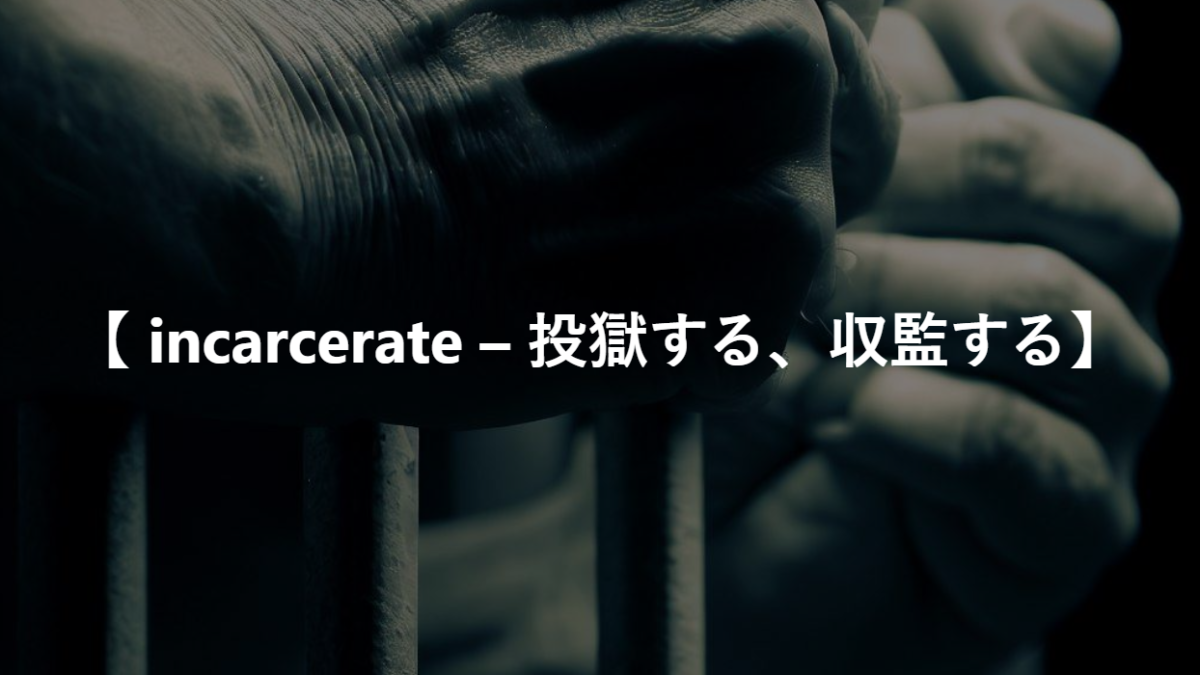語源・類義語・反対語・例文
【 incarcerate – 投獄する、収監する】という単語の語源とか由来を知っていますか?
「Incarcerate」という単語は、ラテン語の「incarceratus」から来ています。これは、「in-」(内部に)と「carcer」(刑務所)の組み合わせで、「刑務所に入れる」または「拘束する」という意味です。この用語は、人を刑務所や牢獄に閉じ込める行為を指すために使われるようになりました。時間が経つにつれ、「incarcerate」は法的または権威的な文脈で、個人を物理的に拘束し、自由を奪う行為を指す言葉として発展しました。
The word “incarcerate” originates from the Latin “incarceratus,” which is a combination of “in-” (inside) and “carcer” (prison), meaning “to put into prison” or “to confine.” This term has come to be used to describe the act of confining someone in a prison or jail. Over time, “incarcerate” has evolved to be used in legal or authoritative contexts to denote the act of physically restraining an individual, depriving them of their freedom.
この単語の類義語・反対語を教えてください。
類義語:
- Imprison – 投獄する: 刑務所や監獄に人を閉じ込める行為。
- Jail – 拘留する: 短期間の拘留や未決囚の収監を指すことが多い。
- Detain – 拘束する: 一時的に自由を奪う、特に法的な理由で。
- Confine – 制限する: 特定の空間や境界内に限定する。
- Lock up – 閉じ込める: 安全や保護のために、または刑事手続きの一環として人を閉じ込める。
反対語:
- Release – 釈放する: 刑務所や拘留から人を自由にする行為。
- Liberate – 解放する: 抑圧や束縛から自由にする。
- Free – 自由にする: 制約や拘束から解き放つ。
- Discharge – 放免する: 公式に義務や責任から解放する、特に軍事サービスや医療治療後。
- Exonerate – 免罪する: 罪や責任から完全に解放する、特に証拠に基づく。
この単語に似た単語で間違いやすい単語はありますか?
- Incarnate: 「具体化する」「化身する」という意味で、何かの概念や精神が肉体を持つ形で現れることを指します。たとえば、「love incarnate」は「愛の化身」を意味します。
- Incarceration: これは「incarcerate」の名詞形で、「投獄」「収監」という意味です。つまり、人が刑務所や牢獄に閉じ込められる状態や期間を指します。
この単語を使った例文を5つほど教えてください。
The judge decided to incarcerate the convicted criminal for a period of ten years.
(裁判官は有罪とされた犯罪者を10年間の期間で投獄することを決定しました。)
The prison system aims to rehabilitate inmates during their time of incarceration.
(刑務所制度は、収監中に受刑者を更生させることを目指しています。)
He was incarcerated in a maximum-security prison due to the severity of his crimes.
(彼は犯罪の重さにより、最高警備の刑務所に収監されました。)
The government is taking steps to reduce the over-incarceration of non-violent offenders.
(政府は非暴力犯罪者の過度な収監を減らすための措置を取っています。)
She felt a sense of relief when her brother was finally released from incarceration.
(彼女は、兄がついに収監から解放されたときに安心感を感じました。)
【 incarcerate – 投獄する、収監する】のコロケーション
- Incarcerate for life: 終身刑にする。犯罪者がその生涯を刑務所で過ごすことを意味します。
- Incarcerate without bail: 保釈なしで収監する。被告人が裁判を待つ間、保釈金なしで刑務所に拘留される状況を指します。
- Incarcerate in a maximum security prison: 最高セキュリティ刑務所に収監する。犯罪者が最も厳重な警備が施された刑務所に置かれることを意味します。
- Incarcerate for a crime: 犯罪で収監する。特定の犯罪行為により個人が刑務所に入れられる状況を指します。
- Incarcerate pending trial: 裁判待ちで収監する。被告人が裁判の日まで刑務所に拘留されることを指します。
「Incarcerate」という単語は、法的な文脈や刑事司法のシステム内で広く使用され、個人が刑務所や拘留施設に収容されることを指します。この単語は特定のコロケーション、つまり一緒によく使われる語句とともに見ることが多いです。
まず、「Incarcerate for life」は終身刑を意味し、この表現は通常、重大な犯罪に対する厳しい刑罰を示します。これは、犯罪者が残りの人生を刑務所で過ごすことを意味します。
次に、「Incarcerate without bail」は、被告人が保釈金なしで刑務所に拘留される状況を指し、これは通常、逃亡のリスクが高いと見なされる場合や、非常に重い犯罪の場合に適用されます。
「Incarcerate in a maximum security prison」は、被告や犯罪者が最もセキュリティレベルが高い刑務所に置かれる状況を説明します。これは、通常、最も危険な犯罪者に対して用いられる措置です。
また、「Incarcerate for a crime」は、特定の犯罪で個人が投獄されることを明確に指します。これは一般的な法的な措置であり、犯罪に応じた刑期を意味します。
最後に、「Incarcerate pending trial」は、被告人が裁判が行われるまで刑務所に拘留されることを示します。これは、公正な裁判を保証するため、または社会への危険を防ぐために行われることがあります。
これらのコロケーションは、「incarcerate」という単語がどのように使われ、どのような状況で適用されるかを示しており、通常は刑罰や法的な判断に密接に関連しています。
The term “incarcerate” is extensively used in legal contexts and the criminal justice system, referring to the act of confining an individual in a prison or detention facility. This word is commonly found in specific collocations, that is, phrases that are frequently used together.
First, “Incarcerate for life” means sentencing someone to life imprisonment. This expression typically denotes a severe punishment for grave crimes, signifying that the criminal will spend the remainder of their life behind bars.
Next, “Incarcerate without bail” refers to a situation where a defendant is kept in jail without the option for bail. This usually applies in cases where there is a high risk of flight or for very serious offenses.
“Incarcerate in a maximum security prison” describes circumstances where the accused or convict is placed in a prison with the highest level of security. This measure is generally reserved for the most dangerous criminals.
Furthermore, “Incarcerate for a crime” explicitly points to the situation where an individual is imprisoned for a specific crime. This is a common legal measure that corresponds to the sentence given for the committed offense.
Lastly, “Incarcerate pending trial” indicates that a defendant is held in jail until their trial occurs. This can be done to ensure a fair trial or to prevent any danger to the community.
These collocations demonstrate how the word “incarcerate” is used and the situations in which it applies, usually closely linked to penalties or legal decisions.
文法問題: “incarcerate” (投獄する、収監する)
- 動詞の形:
The judge decided to _________ the defendant for a period of ten years.
(A) incarcerate
(B) incarcerates
(C) incarcerated
(D) incarcerating
解答と解説:
(A) incarcerate 不定詞 “to” の後には動詞の原形が来ます。
– - 目的語との組み合わせ:
The authorities _________ the criminals in a high-security prison.
(A) incarcerate
(B) incarcerate in
(C) incarcerate to
(D) incarcerate for
解答と解説:
(B) incarcerate in 「~に投獄する」という意味で、incarcerate は前置詞 in と一緒に使われます。
– - 名詞形:
The _________ of political prisoners is a violation of human rights.
(A) incarcerate
(B) incarcerates
(C) incarcerated
(D) incarceration
解答と解説:
(D) incarceration 空欄には主語となる名詞が必要です。incarceration は「投獄」「監禁」という意味の名詞です。
– - 受動態:
The innocent man was wrongly _________ for a crime he did not commit.
(A) incarcerate
(B) incarcerates
(C) incarcerated
(D) incarceration
解答と解説:
(C) incarcerated 男性は「投獄された」という受動態なので、過去分詞の incarcerated が適切です。 - 類義語:
The government _________ the dissidents to silence their opposition.
(A) incarcerated
(B) imprisoned
(C) jailed
(D) all of the above
解答と解説:
(D) all of the above incarcerated, imprisoned, jailed はいずれも「投獄する」「監禁する」という意味で、この文脈ではすべて適切です。

